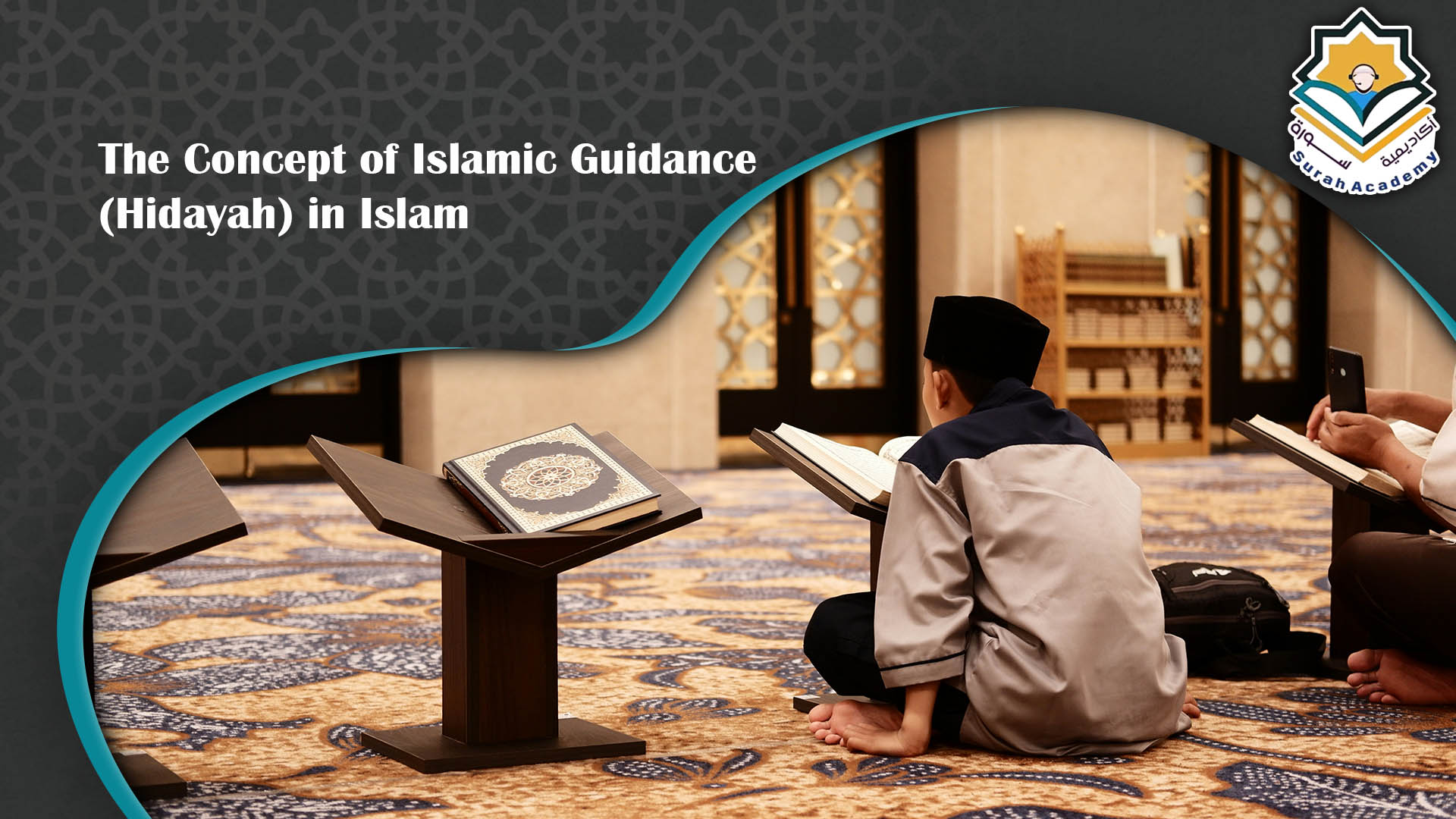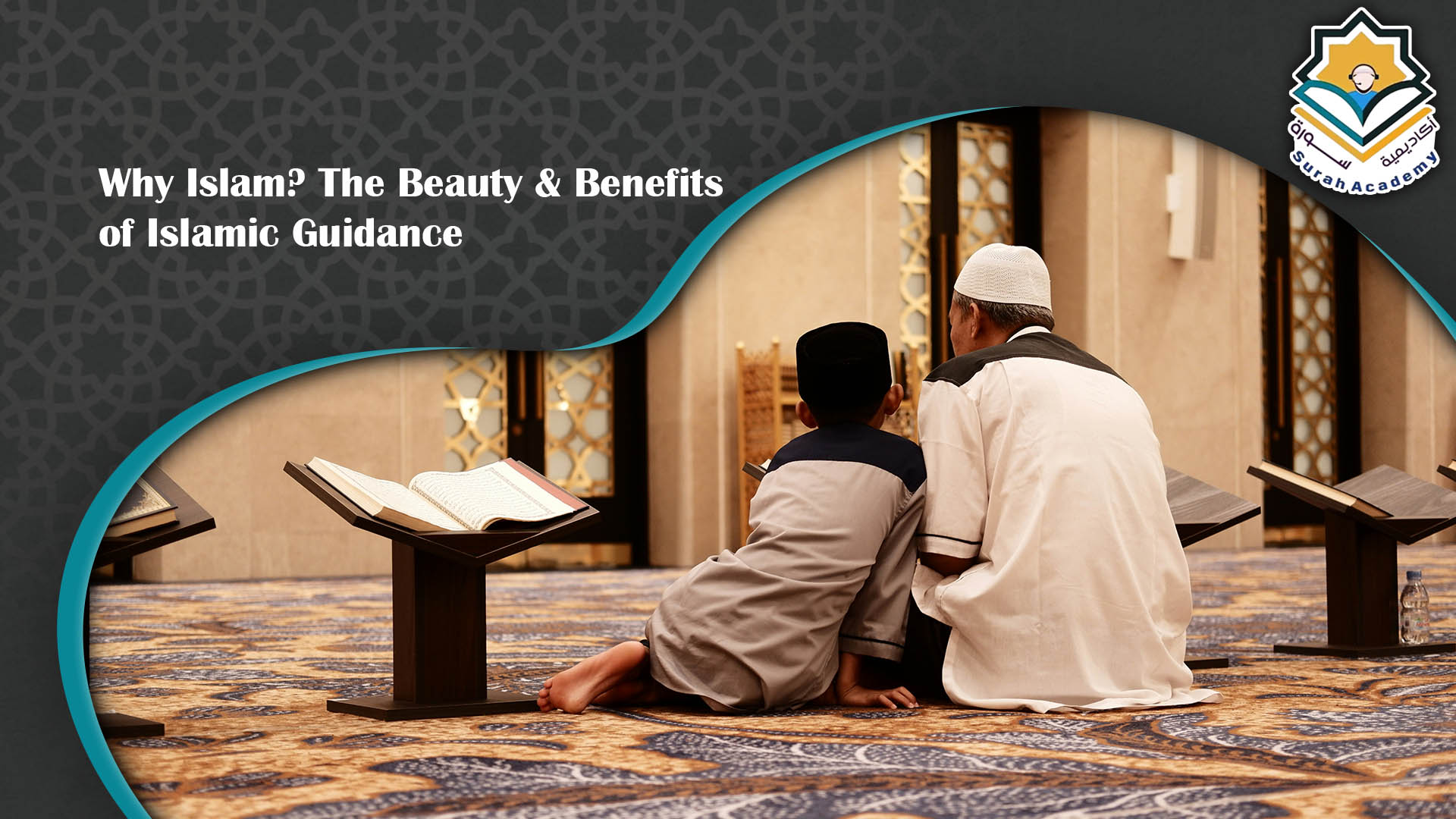Islamic guidance plays a vital role in helping Muslims lead a purposeful life, and Surah Academy is dedicated to providing authentic knowledge rooted in the Quran and Sunnah. Through structured learning, it empowers individuals to strengthen their faith, refine their character, and apply Islamic values in daily life.
By embracing Islamic guidance, students not only deepen their spiritual connection but also gain practical tools to face modern challenges with wisdom and balance.
The Concept of Islamic Guidance (Hidayah) in Islam

Islamic guidance, or Hidayah, is one of the most significant themes in Islam, representing the divine path that Allah (SWT) has set for humanity to attain righteousness, success, and eternal salvation. The Arabic word Hidayah refers to Allah’s direction toward the straight path (Sirat al-Mustaqim). Both the Quran and Hadith describe Hidayah as a mercy and blessing from Allah (SWT), underlining its essential role in shaping a believer’s spiritual journey.
The Presence of Islamic Guidance in the Quran
The concept of islamic guidance and its related terms, such as Yahdi (He guides) and Hudan (guidance), appear more than 300 times in the Quran. These references highlight its importance across different contexts: Allah’s role as the ultimate guide, the qualities of those who accept or reject guidance, and the outcomes of following or abandoning it.
Some key examples include:
Allah as the Ultimate Guide:
“Indeed, [O Muhammad], you do not guide whom you like, but Allah guides whom He wills. And He is most knowledgeable of the rightly guided.” (Surah Al-Qasas, 28:56)
This verse shows that ultimate islamic guidance comes only from Allah. While Prophet Muhammad (PBUH) conveyed the message, it is Allah’s will that grants true guidance.
The Quran as a Source of Guidance:
“This is the Book about which there is no doubt, a guidance for those conscious of Allah.” (Surah Al-Baqarah, 2:2)
The Quran itself is a clear and lasting source of islamic guidance, serving as a roadmap for believers who strive for righteousness.
Guidance through Prophets:
“And We sent not before you any messenger except that We revealed to him that, ‘There is no deity except Me, so worship Me.’” (Surah Al-Anbiya, 21:25)
Prophets were entrusted with delivering Allah’s message and providing humanity with clear direction in line with divine will.
Messenger as a Means of Accountability:
“Whoever is guided is only guided for [the benefit of] himself; and whoever goes astray is only astray to its detriment. And no bearer of burdens will bear the burden of another. And We never punish until We have sent a messenger.” (Surah Al-Isra, 17:15)
This verse emphasizes individual responsibility. Accepting islamic guidance benefits the believer, while rejecting it brings harm upon oneself. It also reflects Allah’s justice—punishment only comes after clear guidance is delivered through a messenger.
Guidance and Misguidance:
“Whoever Allah guides – he is the [rightly] guided; and whoever He sends astray – it is they who are the losers.” (Surah Al-A’raf, 7:178)
Here, the Quran makes a clear distinction between those who follow islamic guidance and those who reject it, warning of spiritual loss for the misguided.
read more: learn islam online
Features of Our Online Quran Tutor Services
At Surah Academy, we are dedicated to providing exceptional and well-structured Quran education through our team of highly qualified online tutors. Our program includes live, interactive classes that allow students to engage directly with their instructors in real time. With customized learning plans tailored to individual needs, we support learners at all levels—beginner, intermediate, and advanced
ensuring a seamless, effective, and enriching learning experience.

The Implications of Islamic Guidance in Daily Life
Islamic guidance has a deep impact on how a believer connects with Allah (SWT), understands their purpose, and directs their actions in everyday life.
Gratitude for Guidance: A believer is encouraged to constantly show gratitude for the blessing of Islamic guidance. The Quran reminds us: “Say, ‘Indeed, the guidance of Allah is the [only] guidance.’” (Surah Al-Baqarah, 2:120). This highlights that divine guidance is unmatched and deserves continuous thankfulness.
Seeking Guidance through Prayer: In every unit of Salah, Muslims recite Surah Al-Fatihah, which includes the heartfelt plea: “Guide us to the straight path.” (Surah Al-Fatihah, 1:6). This daily reminder reflects the believer’s dependence on Allah (SWT) for preserving and strengthening their level of Islamic guidance.
Avoiding Arrogance: Understanding that guidance is a gift from Allah fosters humility. No one achieves righteousness on their own; it is only through Allah’s mercy and guidance that a person is able to recognize and follow the truth.
Read also: quran tajweed classes online
The Main Authorized Sources of Islamic Guidance: The Four Revealed Books
The Quran is the ultimate source of Islamic guidance, revealed by Allah (SWT) to direct believers in every aspect of life. Along with the Sunnah of Prophet Muhammad (ﷺ), it forms the foundation of faith, law, and worship.
Throughout history, Allah revealed several scriptures to His prophets. Among them, four major books are recognized in Islam:
The Torah (Tawrat): Given to Prophet Musa (AS), described as containing “guidance and light” (Quran 5:44).
The Psalms (Zabur): Revealed to Prophet Dawud (AS), expressed through songs and praises (Quran 4:163).
The Gospel (Injeel): Sent to Prophet Isa (AS), emphasizing Tawheed and divine guidance (Quran 7:156).
The Quran: Revealed to Prophet Muhammad (ﷺ), final and perfectly preserved: “Indeed, it is We who sent down the Reminder, and indeed, We will be its guardian.” (Quran 15:9).
Other scriptures, like the Suhuf revealed to Ibrahim (AS) and Musa (AS), are also mentioned, though not preserved. Unlike earlier texts, the Quran remains unchanged for over 1400 years and continues to be the
The Responsibility of Following Islamic Guidance
The Quran repeatedly reminds believers that islamic guidance comes with personal accountability. Choosing the path of Hidayah leads to both worldly success and eternal reward, while rejecting it causes only self-harm. The principle is clear: no one carries another’s burden. Moreover, Allah’s justice ensures that no one is held accountable until they receive clear guidance.
In essence, Hidayah is both a divine gift and a test of faith. It highlights the importance of free will, personal responsibility, and the fairness of Allah’s judgment—making islamic guidance the key to a meaningful and successful life.
Types of Islamic Guidance
Islamic scholars explain that Islamic guidance can be understood through different types, each reflecting its depth and comprehensive nature:
General Guidance (Hidayah ‘Aammah)
This refers to the natural ability Allah (SWT) has placed within every human being to distinguish between right and wrong. As the Quran says: “And [by] the soul and He who proportioned it. And inspired it [with discernment of] its wickedness and its righteousness.” (Surah Ash-Shams, 91:7-8). Every person is born with this inner sense of morality, which forms the foundation for seeking further Islamic guidance.
Specific Guidance (Hidayah Khassah)
This type of guidance is granted to those who sincerely seek Allah’s (SWT) pleasure and strive for righteousness. The Quran highlights this connection between effort and divine support: “And those who strive for Us – We will surely guide them to Our ways.” (Surah Al-Ankabut, 29:69). Through effort and sincerity, believers receive special Islamic guidance that strengthens their faith.
Guidance to the Path of Paradise
The highest form of Islamic guidance is being directed to eternal success in the Hereafter. This is the ultimate reward for those who live their lives in obedience to Allah’s (SWT) commands and remain steadfast on the straight path.
Why Islam? The Beauty & Benefits of Islamic Guidance

Are all religions the same? How can one know which path is correct? Why Islam stands out is because of the beauty, benefits, and timeless nature of Islamic Guidance, which offers clarity and purpose compared to other belief systems.
1. A Close Relationship with the Creator
At the heart of Islamic Guidance is the emphasis on building a personal and direct connection with God. Islam teaches that true peace and happiness come from remembering and obeying the Creator:
“Truly, in remembering God do hearts find rest.” (Quran 13:28)
Muslims worship God directly, without intermediaries, which strengthens their awareness of Him and fills the inner void that material possessions or worldly desires can never satisfy.
2. A Positive Outlook on Life
Through Islamic Guidance, a believer learns to view life’s events—both good and bad—as tests from God. Gratitude during blessings and patience during hardships form the foundation of a balanced and happy life. Islam empowers people to rise above extremes of joy and despair, encouraging generosity, resilience, and optimism.
3. A Pure and Clear Concept of God
Why Islam? One of the most powerful answers lies in its uncompromisingly pure monotheism. Islamic Guidance teaches that:
- God is One and Unique, without partners or equals.
- God has no family, rivals, or human limitations.
- God is Perfect, All-Powerful, and above all creation.
- Unlike other religions, Islam affirms God’s greatness without attributing to Him any human weakness or dependency.
4. A Faith Rooted in Evidence and Reason
Another beauty of Islamic Guidance is its harmony between faith and intellect. The Quran challenges people to think, reflect, and use their intelligence. Its preservation, linguistic perfection, scientific insights, and profound impact are clear proofs that it is a divine revelation.
5. Forgiveness and Mercy
Islam teaches that every human is born pure and that sins can be forgiven directly by God without the need for confession or intermediaries. Through sincere repentance—remorse, refraining from sin, and intending not to repeat it—God’s mercy is always accessible:
“Do not despair of God’s mercy; He will forgive you of all your sins.” (Quran 39:53)
6. Accountability and Ultimate Justice
A central part of Islamic Guidance is accountability. Every person is responsible for their actions and will face ultimate justice on the Day of Judgment. This assurance fosters harmony, fairness, and hope in a just outcome beyond this world.
7. A Universal and Timeless Message
The beauty and benefits of Islamic Guidance also lie in its universality. The message of Islam applies to all people, across all times and places. In Islam, true distinction comes only through faith and righteous deeds—not race, wealth, gender, or social status.
In conclusion, Islamic guidance serves as the ultimate framework for living a meaningful and righteous life. It directs believers toward faith, morality, and devotion to Allah (SWT) while protecting them from misguidance.
By following the Quran and the Sunnah, Muslims find clarity in their purpose and strength in their actions, ensuring success in this world and eternal peace in the Hereafter.
Learn more: quran recitation course
